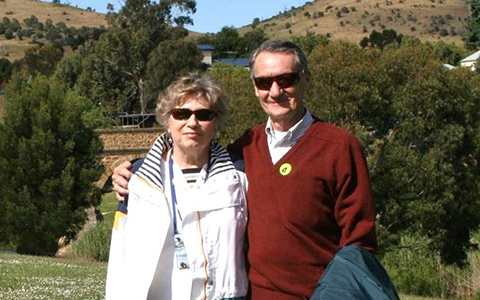 Ever since William “Bill” Pierskalla ’56, MBA ’58 came to Harvard from a rural farm in northern Minnesota, he’s looked for ways to give back. His undergraduate experience—what he describes as a true enlightenment—was made possible through financial aid and the part-time jobs he held.
Ever since William “Bill” Pierskalla ’56, MBA ’58 came to Harvard from a rural farm in northern Minnesota, he’s looked for ways to give back. His undergraduate experience—what he describes as a true enlightenment—was made possible through financial aid and the part-time jobs he held.
“I was able to go to Harvard on full scholarship. A whole new world opened up for me, a world of literature and arts that I hadn’t known,” he says.
This love of learning and research inspired Bill to earn an MBA at Harvard and a PhD in operations research and led to a 50-year career in academia. And it’s why he and his wife Carol are such ardent supporters of education. “The generosity of others paid my way, and we have to give something back,” he says.
Now retired and splitting their time between Florida and Minnesota, the Pierskallas contacted Harvard’s Office of Gift Planning (OGP) to see how they might structure a substantive gift to the College while also taking care of their family.
“Beyond their desire to give back to Harvard, the Pierskallas had well-defined goals that included financial support for one of their grandsons,” says Peter Kimball, OGP’s executive director.
He suggested that they create a charitable remainder unitrust (CRT), a life income plan that gives donors the ability to make a significant gift to Harvard while receiving an income for life or a term of years. In the Pierskallas’ case, the CRT will benefit three recipients; they will receive an income during their lifetimes, after which it will go to their grandson for a period of twenty years.
“Our grandson has learning disabilities and works very hard to support himself,” says Carol, who is an author and gerontologist. “We just want to find a way to help him after we’re gone.”
Bill also likes knowing that their gift is unrestricted, which will allow Harvard to use the funds according to their needs. Having served for a number of years as an academic dean, he knows firsthand how important flexible resources are to top centers of research.
“Even the best universities with good-size budgets always have more needs. Education keeps changing and growing with more and more students,” he says. “My life has always been about education, and we’re thrilled to support the future of education at Harvard.”